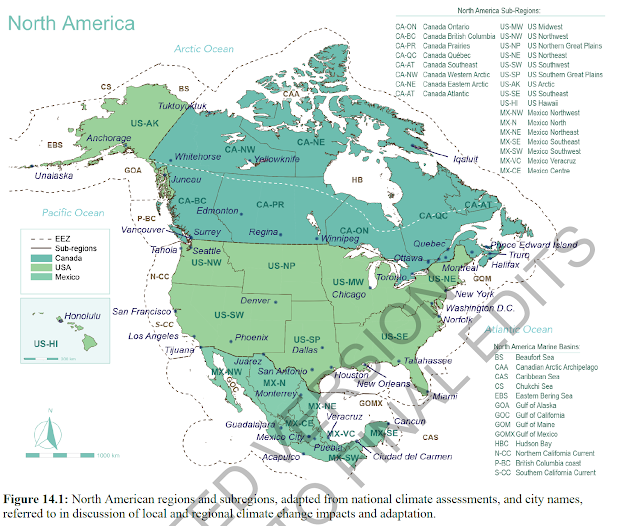North America faces severe global warming impacts by 2050 if there is no remediation, including on economic activity, physical and mental health, public safety and biodiversity. Mitigation based on equitable outcomes and resource sharing across economic strata would likely result in the best overall climate change-related income for all citizens. However, politicization of the topic of global warming and decades-long campaigns of misinformation have removed much of the political and social will to accomplish any of these objectives. The world’s historical leader in greenhouse gas emissions remains a house fiercely divided against itself.
Over the past twenty years, impacts of climate change have
grown in frequency and strength. As elsewhere on the planet, rising
temperatures have increased heat-related deaths, vector-borne, water-borne and
food-borne illnesses. These impacts are not equal throughout regions or
economic strata, but fall more heavily on poorer, lower-lying regions. Since
1961 agricultural productivity has declined by 12.5%, with losses starting in
Canada and moving progressively toward the south. Droughts have
disproportionately affected the farther north areas (as opposed to the
already-arid, already-hotter south). Temperature rise has negatively impacted
aquaculture, and led to rapid movement of species which has put severe stress
on ecosystems, above all where the migrants invade.
Reduced snowpack throughout the continent has reduced freshwater availability and caused lake and river systems to deteriorate in quality. Meanwhile, exploitation, especially in the southwestern US, has disrupted ecosystems through lack of water. Water quality and availability are impacting agriculture, fisheries, tourism and other industries. Rising temperatures in the air, ocean and freshwater, and in the ground are affecting nearly all species and leading to die-offs. Nature-based forest management systems, such as controlled burns and other techniques, are increasingly unable to keep up with extreme heat and arid conditions which produce massive fires.
Disaster recovery is claiming an increasingly large share of public and private expenditures. Indigenous peoples, already pushed to the margins of survival in many camps across the continent, are being disproportionately impacted by drought and, further north, loss of ice and permafrost. These effects are expected to worsen considerably in the coming century, especially without mitigation and adaptation.
Be brave, be steadfast, and be well.













No comments:
Post a Comment